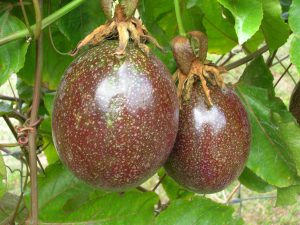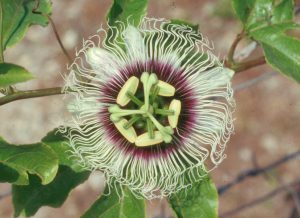
With demand for passion fruit growing in the United States, researchers are exploring how domestic production of this sought-after fruit could expand, thanks to a grant from U.S. Department of Agriculture’s (USDA) National Institute of Food and Agriculture (NIFA).
“This project seeks to determine the current status of the industry, and bring together stakeholders, researchers and extension faculty to identify challenges and opportunities for the growth of a U.S. passion fruit industry,” said Jonathan Crane, a tropical fruit specialist at UF/IFAS Tropical Research and Education Center (UF/IFAS TREC) and a collaborator on the grant awarded to Mississippi State University.
The research team’s first step is to obtain baseline information from current passion fruit growers, packers, shippers and other interested parties through an online survey. The deadline to submit the voluntary survey is May 31, 2022.
“This survey will help research and extension faculty involved in this nationwide effort to plan and apply for grants that could subsequently assist with pest issues such as insects and diseases, disorders, postharvest issues and cultural practices,” said Crane.
The results of the survey will also allow researchers to organize a strategic planning meeting with stakeholders to address the needs of the industry and plan a path forward for research and extension projects.
As part of the project, researchers have scheduled a conference for June 14 and 15 with in-person presentations and a field day at UF/IFAS TREC in Homestead. The conference also includes an online meeting. Growers, researchers and interested participants are invited to register for this portion of the project through this link.
The purpose of this passion fruit conference is to bring together UF, MSU, University of California and University of Hawaii researchers with passion fruit growers and packers and accomplish several objectives:
- Gather data on the size and status of the US industry at present,
- Identify and prioritize the major constraints and opportunities for expanding the industry in the U.S., including how climate will impact where passion fruit can grow,
- Identify passion fruit varieties that are sweeter, bigger more marketable,
- Identify diseases and insect pests,
- Identify marketing opportunities for fresh fruit and food services, specialty markets, online businesses and more.

“The passion fruit industry in the U.S. is a high-value domestic crop,” said Crane. Consumers are interested in passion fruit for its nutritional value as well as its use as an ornamental plant they can grow at home.
Passion fruit production is limited to warm climates, with Florida being the highest producer with 110 acres, followed by California, Puerto Rico and Hawaii.
Growers in Southern states with warm climates, such as Texas, Louisiana, Mississippi, Alabama, Georgia, are now interested in growing passion fruit too. Some have already attempted to grow passion fruit in Texas, Louisiana and Alabama, added Crane.
“With the help of growers, packers, shippers and other interested parties, the passion fruit industry can extend beyond those states,” he said.
###
By Lourdes Mederos, public relations manager
ABOUT UF/IFAS
The mission of the University of Florida Institute of Food and Agricultural Sciences (UF/IFAS) is to develop knowledge relevant to agricultural, human and natural resources and to make that knowledge available to sustain and enhance the quality of human life. With more than a dozen research facilities, 67 county Extension offices, and award-winning students and faculty in the UF College of Agricultural and Life Sciences, UF/IFAS brings science-based solutions to the state’s agricultural and natural resources industries, and all Florida residents.
ABOUT ‘FOOD IS OUR MIDDLE NAME’ CAMPAIGN
Feeding a hungry world takes effort. Nearly everything we do comes back to food: from growing it and getting it to consumers, to conserving natural resources and supporting agricultural efforts. Explore all the reasons why at ifas.ufl.edu/food or follow #FoodIsOurMiddleName.
 1
1
